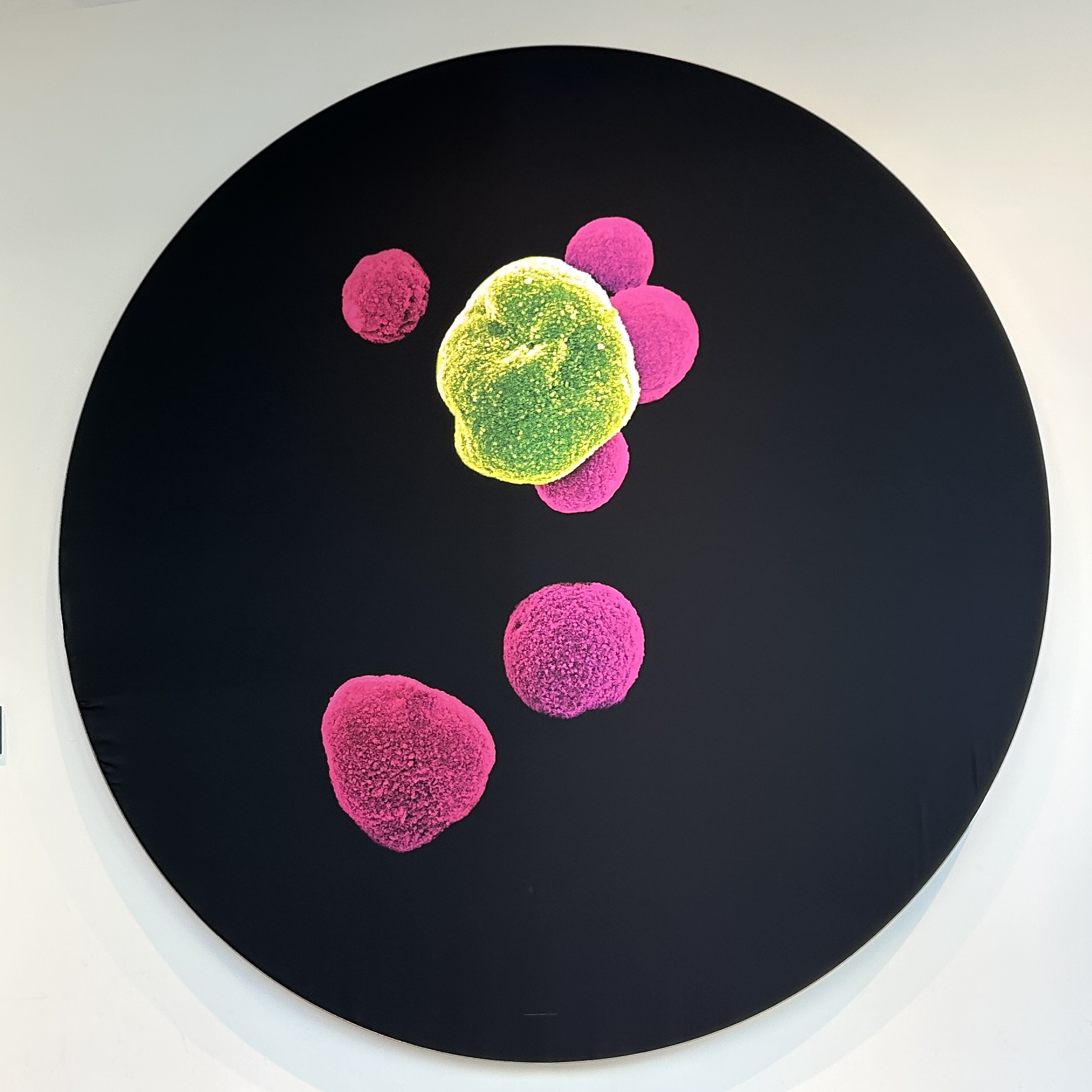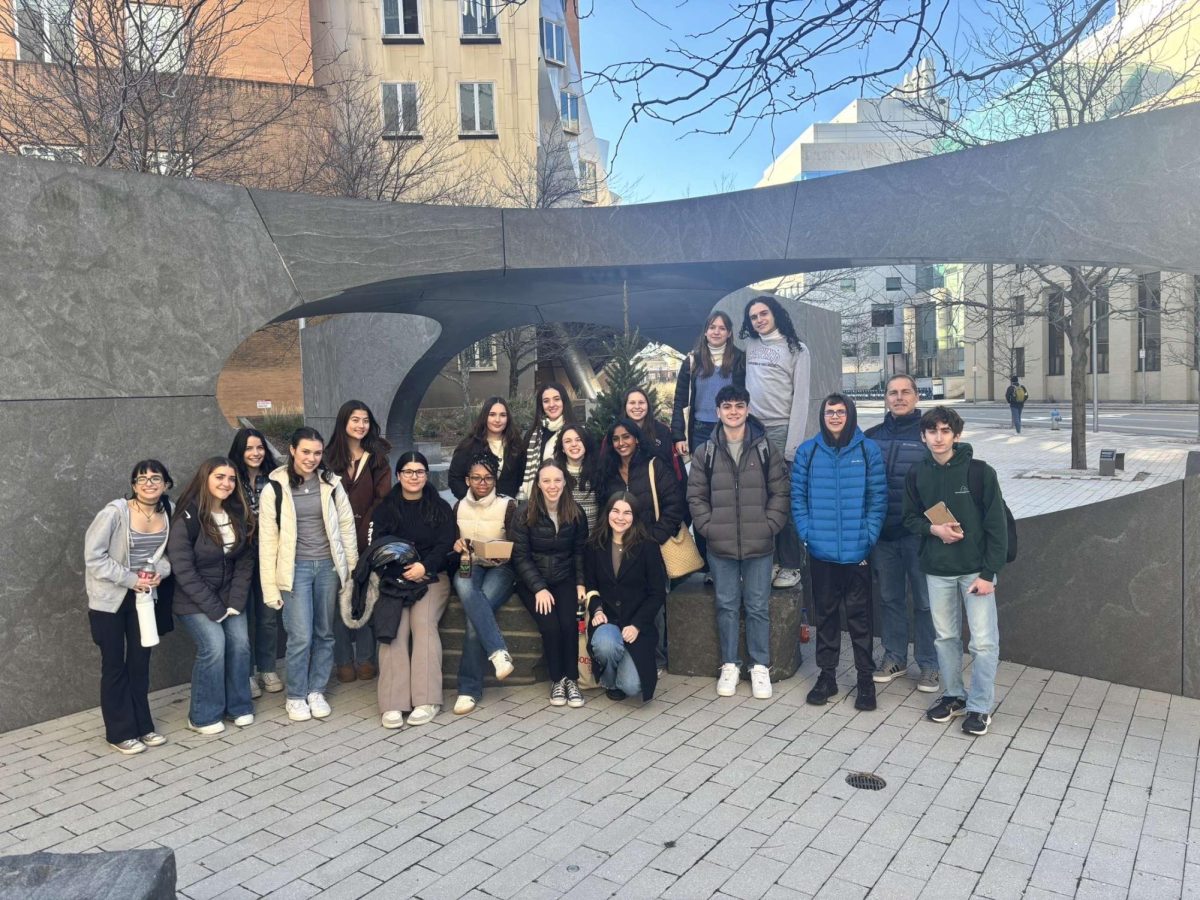The Psychology Club visited the Koch Institute at MIT on a recent field trip where they learned about research and explored the connections between psychology and biology, and its role in cancer treatment.
After a lengthy bus ride into Boston, the group made their way to the Koch Institute, where they were immersed into a world of advanced research. Known for its contributions to cancer treatment and integrative research, the Institute welcomed the students with an engaging introduction to its accomplishments and overall mission. The presentation helped to highlight the approach where technology and research join to study cancer and cell behavior.
The students learned about how cells communicate with one another and how these processes can be disrupted in cancerous growths. They discovered how treatments being studied at the Institute, such as chemotherapy or immunotherapy, can alter the cell behavior and restore their functions.
“It was really interesting, and it opened my eyes to how you could use psychology and biology in your future careers, and how important a career in research is for the betterment of patients,” said senior Alba Vranari.
The club also got the chance to see the qualities essential to working in a research-focused environment as they require strong communication and teamwork to be successful.
“Like all sciences, psychology requires curiosity, creativity, and collaboration. The Koch Institute for Integrative Cancer Research is a place that fosters all three of those qualities and rewards them. Also, the researchers there are passionate and compassionate—both traits which are important in the field of psychology,” said club advisor Michael Morris.
The visit continued with a tour of the Institute’s revolutionary facilities, and students were introduced to the exact space where this extensive research occurs. The group was brought through hallways covered in colorful charts, detailed research posters, and procedural diagrams and they passed labs with active experiments. The intricate equipment and tools used to investigate the cancer cell behavior, analyze DNA, and test potential treatments left students inspired.
“It surprised me how collaborative it was inside the lab itself. I remember we were looking at photos of important stuff on the walls, and there was this woman who walked by and said, ‘Oh yeah, that’s my lab.’ Her lab was one of the ten photos projected on the wall, and I thought, ‘Wow, that’s so cool.’ All of the people in that lab, their work really goes toward important things and they’re really appreciated,” said Vranari.
Students like Vranari got a lot out of the field trip, helping to solidify their interest in the field.
“The trip definitely introduced some more interesting elements that reinforced my interest in psychology,” said junior club member Isabelle Beauvais.
After the tour, the psychology club reconvened in a lab space where they engaged in a mini-lab examining how seaweed can help treat cancer and recreated the innovative uses for modern medications.
An oncology researcher entered to discuss the function of T cells and their role in the immune system’s response to fighting cancer cells before hosting a “Kahoot!” to test the kids’ knowledge.
“We learned a lot about what goes into cancer research, and it really surprised me when [the researcher] talked about how long it actually took to get research into pharmaceutical companies,” Beauvais said.
Aside from the students, the day was impactful for Morris, too, who had the chance to reflect on his personal connections.
“The amazing photographs in the lobby, particularly of the T cell attacking cancer cells, really impacted me because a good friend of mine was recently diagnosed with lymphoma, so seeing that picture felt very personal. I also loved the presentation given by one of the cancer researchers. I was inspired by his research findings on how to help T cells fight cancer cells,” he said.
Following their time at the Koch Institute, the club quickly ate lunch at a nearby dining hall before they made their way across the street toward the Broad Institute. Although they had limited time, the students explored exhibits in the lobby and played a simulation activity about pharmaceutical researchers, deepening their awareness of the challenges and rewards of developing treatments while awaiting the bus back to school.
“I hope [students] came away from this trip with a sense of hope and optimism, knowing that there are some brilliant, passionate scientists collaborating and doing amazing work every day to find a cure for cancer,” said Morris.
For the Psychology Club, the day served as an opportunity to connect outside the classroom, where students strengthened their shared passion for psychology and understanding the human mind. The experience not only broadened their interest but also enriching their appreciation for the research that goes into creating medicines.
“I’m grateful for the opportunity to help out Mr. Mintz during his absence. It has been great to see some familiar faces of my former students. As a Middle School teacher, I don’t always get to interact with my students once they leave my classroom,” Morris said. “And it has been great meeting so many wonderful students who share my passion for learning more about psychology and our amazing mind.”
The students left with a new understanding of how research combines with innovative technologies to solve challenges in medicine, providing hope for future development in cancer treatments and more.


